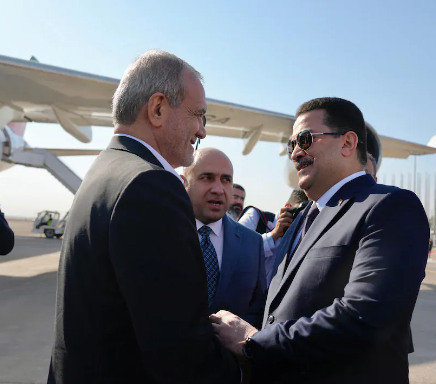Iran’s new president, Masoud Pezeshkian, embarked on his first international visit to Iraq on Wednesday. This three-day trip is seen as an effort to reinforce the close relationship between the two neighboring countries.
The visit comes amid escalating turmoil in the Middle East due to the Gaza conflict, which has impacted regional politics and complicated Iraq’s relations with the United States. Pezeshkian’s arrival was met by Iraqi Prime Minister Mohammed Shia al-Sudani, marking the start of discussions aimed at deepening bilateral ties.
Pezeshkian has prioritized improving relations with neighboring countries as part of his strategy to alleviate Iran’s international isolation and the effects of US-led sanctions. His visit follows new Western sanctions imposed on Iran for its alleged provision of missiles to Russia for use in Ukraine.
In response to these sanctions, Iranian foreign ministry spokesman Nasser Kanani warned Britain, France, and Germany of potential retaliation. Meanwhile, security issues have emerged, with a recent explosion at a US-led coalition base in Iraq attributed to an attempt to disrupt Pezeshkian’s visit.
Historically, ties between Iran and Iraq have strengthened since the 2003 US-led invasion of Iraq. Both nations, sharing a Shiite majority, have developed a close relationship. Pezeshkian emphasized Iraq’s importance to Iran, describing it as a “friend, brother, and Muslim country.”
Pezeshkian, who assumed office in July following the death of his predecessor, has been focused on leveraging relationships with neighboring countries to counteract the impact of international sanctions. His administration has made significant moves to open Iran’s diplomatic channels.
Trade between Iran and Iraq is substantial, with Iran being a key trade partner and major energy supplier. Non-oil trade between the countries reached nearly $5 billion from March 2024. Additionally, Iran exports gas to Iraq, covering a significant portion of the country’s electricity needs.
Amid ongoing US military presence in Iraq, there have been discussions about a drawdown of troops. The US-led coalition, currently with about 2,500 troops in Iraq, plans to withdraw from most of the country by September 2025. This move is part of broader regional adjustments amidst rising tensions.
Pezeshkian’s visit also includes a stop in the Kurdish regional capital, Arbil, to engage with Kurdish officials. This visit follows Iran’s recent security agreement with Iraq aimed at addressing issues with Kurdish rebel groups in the autonomous region.
The trip underscores Pezeshkian’s commitment to reinforcing Iran-Iraq relations amidst regional challenges and shifting geopolitical dynamics.

